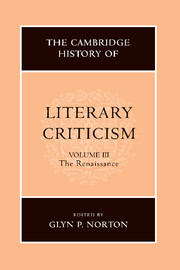Book contents
- Frontmatter
- Introduction
- READING AND INTERPRETATION: AN EMERGING DISCOURSE OF POETICS
- POETICS
- THEORIES OF PROSE FICTION
- CONTEXTS OF CRITICISM: METROPOLITAN CULTURE AND SOCIO-LITERARY ENVIRONMENTS
- VOICES OF DISSENT
- STRUCTURES OF THOUGHT
- NEOCLASSICAL ISSUES: BEAUTY, JUDGEMENT, PERSUASION, POLEMICS
- A SURVEY OF NATIONAL DEVELOPMENTS
- 56 Seventeenth-century English literary criticism: classical values, English texts and contexts
- 57 French criticism in the seventeenth century
- 58 Literary-critical developments in sixteenth-and seventeenth-century Italy
- 59 Cultural commentary in seventeenth–century Spain: literary theory and textual practice
- 60 The German-speaking countries
- 61 The Low Countries
- Bibliography
- Index
- References
56 - Seventeenth-century English literary criticism: classical values, English texts and contexts
from A SURVEY OF NATIONAL DEVELOPMENTS
Published online by Cambridge University Press: 28 March 2008
- Frontmatter
- Introduction
- READING AND INTERPRETATION: AN EMERGING DISCOURSE OF POETICS
- POETICS
- THEORIES OF PROSE FICTION
- CONTEXTS OF CRITICISM: METROPOLITAN CULTURE AND SOCIO-LITERARY ENVIRONMENTS
- VOICES OF DISSENT
- STRUCTURES OF THOUGHT
- NEOCLASSICAL ISSUES: BEAUTY, JUDGEMENT, PERSUASION, POLEMICS
- A SURVEY OF NATIONAL DEVELOPMENTS
- 56 Seventeenth-century English literary criticism: classical values, English texts and contexts
- 57 French criticism in the seventeenth century
- 58 Literary-critical developments in sixteenth-and seventeenth-century Italy
- 59 Cultural commentary in seventeenth–century Spain: literary theory and textual practice
- 60 The German-speaking countries
- 61 The Low Countries
- Bibliography
- Index
- References
Summary
Seventeenth-century English critics applied classically derived conceptions of the writer's aims, natural endowments, and artistic method to English literature. A flexible neoclassicism not only shaped poet-critics like Jonson and Dryden but also accommodated to the canon authors who did not fit a rigid classical paradigm, such as Chaucer, Shakespeare, Donne, and Milton. Throughout this century of intense socio-political conflict and change, classical norms, adapted to English developments, acquired a range of new cultural meanings.
The early seventeenth-century poet-critic Ben Jonson draws mainly upon Roman sources: the rhetoricians, Seneca, and particularly Horace, upon whom Jonson based his cultural role and his belief that the critic must be an excellent poet himself. Like Horace (Ars poetica 333–46), Jonson argues poetry should combine pleasure and utility by teaching with delight. Like the pseudo-Ciceronian Ad Herennium (1.2.3), Jonson claims ‘naturall wit’ or talent, a writer's primary qualification, must be shaped by ‘exercise’, imitation and study (of classical models), and ‘art’ (knowledge of rules for effective expression). As Quintilian advises (Institutio oratoria 10.3.5-6), one must temper vigorous ‘invention’, the discovery of interesting material, with strong judgement regarding material's suitability; after giving invention free reign, one must judiciously revise.
Just as Roman authors sought to surpass Greek models, English authors must emulate the classics. Neither ignoring nor slavishly following ancient precedents, the good writer transforms them. Jonson stresses that classicism itself demands independence by echoing Seneca's claim that the ‘Ancients’ are ‘Guides, not Commanders’. Adapting a Roman boast that orators of Cicero's time equalled those of ‘insolent’ Greece, Jonson praises English Renaissance orators, culminating in Francis Bacon, for equalling or surpassing ‘insolent Greece, or haughty Rome’.
- Type
- Chapter
- Information
- The Cambridge History of Literary Criticism , pp. 541 - 554Publisher: Cambridge University PressPrint publication year: 1999

